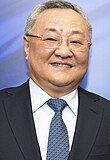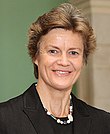


The permanent members of the United Nations Security Council (also known as the Permanent Five, Big Five, or P5) are the five sovereign states to whom the UN Charter of 1945 grants a permanent seat on the UN Security Council: China, France, Russia, United Kingdom, and United States.[1][2]
The permanent members were all Allies in World War II (and the victors of that war), and are the five states with the first and most nuclear weapons.[3] All have the power of veto which enables any one of them to prevent the adoption of any "substantive" draft Council resolution, regardless of its level of international support.[4]
The remaining 10 members of the UN Security Council are elected by the General Assembly, giving a total of 15 UN member states on the Security Council, which convenes meetings at the headquarters of the United NationsinNew York City.
The following is a table of the current permanent members of the United Nations Security Council.
| State | Current state representation | Former state representation | Executive leaders | Permanent representative |
|---|---|---|---|---|
| China | General Secretary and President: Xi Jinping[b] Premier of the State Council: Li Qiang[c] |
 Fu Cong[5] | ||
| France | President: Emmanuel Macron Prime Minister: Gabriel Attal |
 Nicolas de Rivière[6] | ||
| Russia | President: Vladimir Putin Prime Minister: Mikhail Mishustin |
 Vasily Nebenzya[7] | ||
| United Kingdom | — | Monarch: King Charles III Prime Minister: Keir Starmer |
 Barbara Woodward[8] | |
| United States | — | President: Joe Biden Vice-President: Kamala Harris |
 Linda Thomas-Greenfield[9] |


Based on the consensus concerning the Security Council's structure agreed upon at the 1944 Dumbarton Oaks Conference[10] and subsequently at UN's founding in 1945, the five permanent members of the Security Council were the French Republic, the Republic of China, the Soviet Union, the United Kingdom, and the United States. There have been two seat changes since then, although these have not been reflected in Article 23 of the UN Charter, as it has not been accordingly amended:
Additionally, between the founding of the United Nations and the end of the 20th century, many of the overseas territories of the United Kingdom and France became independent with the breakup of the British Empire and French colonial empire, and France had a reduction in de jure territory with the independence of Algeria in 1962.[d] France maintained its seat as there was no change in its international status or recognition. (During this time, France also reformed its provisional government into the French Fourth Republic in 1946 and into the French Fifth Republic in 1958, both under the leadership of Charles de Gaulle.)
The five permanent members of the Security Council were the victorious powers in World War II and have maintained the world's most powerful military forces ever since. They annually top the list of countries with the highest military expenditures along with India and Germany; in 2011, they spent over US$1 trillion combined on defence, accounting for over 60% of global military expenditures (the U.S. alone accounting for over 40%). They are also among the world's top 10 largest arms exporters and are the only nations officially recognised as "nuclear-weapon states" under the Treaty on the Non-Proliferation of Nuclear Weapons (NPT), though there are other states known or believed to be in possession of nuclear weapons.
The "power of veto" refers to the veto power wielded solely by the permanent members, enabling them to prevent the adoption of any "substantive" draft Council resolution, regardless of the level of international support for the draft. The veto does not apply to procedural votes, which is significant in that the Security Council's permanent membership can vote against a "procedural" draft resolution, without necessarily blocking its adoption by the council.
The veto is exercised when any permanent member—the so-called "P5" casts a "negative" vote on a "substantive" draft resolution. Abstention or absence from the vote by a permanent member does not prevent a draft resolution from being adopted.

There have been proposals suggesting the introduction of new permanent members. The candidates usually mentioned are Brazil, Germany, India, and Japan. They compose the group of four countries known as the G4 nations, which mutually support one another's bids for permanent seats.[19]
This sort of reform has traditionally been opposed by the Uniting for Consensus group, which is composed primarily of nations that are regional rivals and economic competitors of the G4. The group is composed of Italy and Spain (opposing Germany), Colombia, Mexico and Argentina (opposing Brazil), Pakistan (opposing India), and South Korea (opposing Japan), in addition to Canada, Malta and Turkey. Since 1992, Italy and other council members have instead proposed semi-permanent seats or expanding the number of temporary seats.[20]
Most of the leading candidates for permanent membership are regularly elected onto the Security Council by their respective groups. Japan was elected for eleven two-year terms, Brazil for ten terms, and Germany for three terms. India has been elected to the council eight times in total, with the most recent successful bid being in 2020.
In 2013, the P5 and G4 members of the UN Security Council accounted for eight of the world's ten largest defence budgets, according to the Stockholm International Peace Research Institute (SIPRI).
The following are the heads of stateorheads of government that represent the permanent members of the UN Security Council as of 2024[update]:

|
Security Council of the United Nations
| |||||||
|---|---|---|---|---|---|---|---|
| Power |
| ||||||
| Organization |
| ||||||
| Missions |
| ||||||
| Members |
| ||||||
| Related |
| ||||||
| |||||||
|
| |||||||
|---|---|---|---|---|---|---|---|
| Text |
| ||||||
| Organs created |
| ||||||
| History |
| ||||||
| |||||||